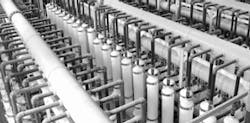Treatment of Industrial Wastewater for Reuse in Turkey
In 2006, Arbiogaz from Istanbul, Turkeym received the order to upgrade an existing wastewater treatment plant (WWTP). The system consisted of a two-stage membrane system combining ultrafiltration (UF) and reverse-osmosis (RO) with a capacity of 50,000 cu m per day (50 ML/day). Membrane technology was necessary to meet the increased water quality requirements of the various industrial clients, and it prevented the need of costly potable water for production purposes.
Membrana GmbH ran pilot tests from January 2007 to August 2007 to obtain reliable data supporting the basic system design and to identify possible impacts from the operation of the existing WWTP. In parallel, Membrana was entrusted with the supply of the UF modules for the entire plant.
Challenges
The UF system had to cope with a wide range of industrial impurities, including dyestuffs and several metals due to significant seasonal variations of the raw water quality. Under all conditions, a suspended solid content of less than or equal to 0.1 mg/L had to be maintained, as well as a silt density index (SDI) of less than or equal to 3. Fractions of the UF filtrate could be used and blended with the RO permeate to adjust process water parameters.
Performance
The projected flux of 75 L/sq m/hr in the UF units was achieved during the startup phase. The backwash interval was increased from 30 to 60 minutes, since the transmembrane pressure was held below 0.2 bar (2.9 psi) during filtration.
The chemical-enhanced backwash (CEB) was optimized to cope with the varying raw water quality. During the first eight months of use, one CEB per day was sufficient. When there was a case of high contamination of the raw water side, the frequency was raised to every 12 hours and, in rare cases, to every 8 hours.
In general the UF filtrate quality was checked continuously for SDI-15 of less than 3 and turbidity of less than 0.1 ntu. The high quality of the UF-pretreated water increased the RO yield from 75% up to 85%.
